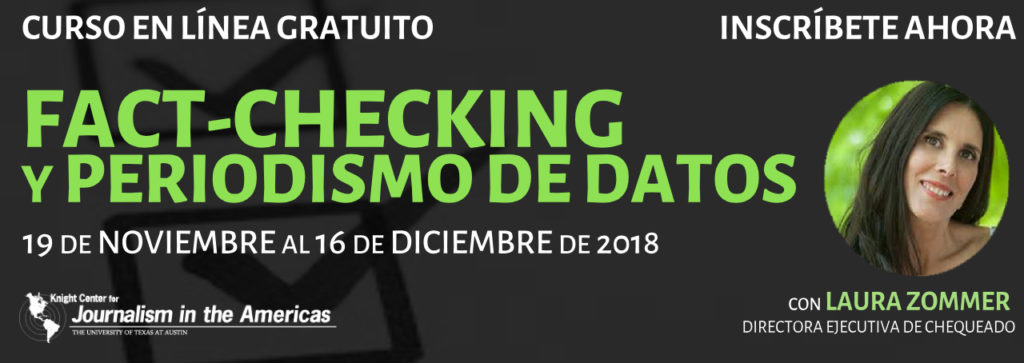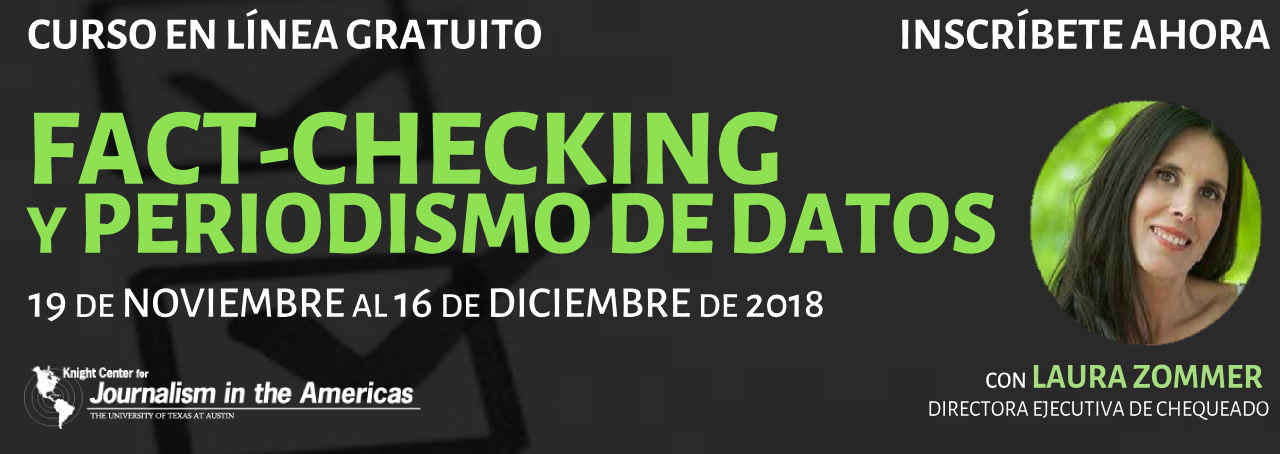Start learning today!
Get early access to learning opportunities from Journalism Courses by the Knight Center.

With media today, identifying fact from fiction can be a challenge. Yet, it’s in this same environment that fact-checking organizations have sprouted and continue to grow around the globe.
There are currently 161 active fact-checking organizations worldwide, according to Duke University’s Reporters’ Lab. And that number is growing as do the ways in which false news and general information spread in our newspapers, on the airwaves and on our screens.
So, for the second time, the Knight Center is offering a popular course taught by a pioneer in fact-checking who will teach students about that practice as well as the growing field of data journalism.
Laura Zommer, executive director of fact-checking site Chequeado from Argentina, will teach the four-week course in Spanish, “Fact-checking and data journalism,” which runs from Nov. 19 to Dec. 16, 2018.
Registration is open so sign up now!
“I invite you to join this course not only to learn tools to share the method of checking and verifying discourse that those of us in the main fact-checking media outlets around the world use, but also to reflect together with colleagues from the entire region about the challenges of our profession in the era of overabundance of data and 24/7 connection,” Zommer said.

When the Knight Center offered the course in 2017, it attracted more than 3,300 students from 47 countries. While this course will have the same structure and themes, it has been updated with new examples and new advances in the field. We are offering the course again due to the ongoing importance of the topic and student requests for another edition.
In week one, students will learn about the history of data journalism and the current role of fact-checking, as well as central concepts of both practices. In week two, they will explore the steps for verifying discourse, good use of sources and how to use data and context. During week three, Zommer will teach about disinformation and “fake news,” or false news, giving a brief history of the phenomenon as well as recommendations for detecting it. And finally, in week four, students will explore formats and strategies for the production and publication of fact-checking.
Students will view weekly video lessons, complete readings, take quizzes and participate in discussion forums. Like all Knight Center courses, the MOOC is asynchronous, meaning students can complete activities during the days and times that are most convenient. There are suggested deadlines so students don’t fall behind.
“Since we offered this course for the first time, a year ago, the problem of misinformation and the spread of false news has grown even more around the world, including many countries in Latin America. And Chequeado, the pioneer of fact-checking journalism in the region, has become even more important in Argentina, where it is based, and around the region, inspiring the creation of more Latin America fact-checking organizations,” said professor Rosental Calmon Alves, founder and director of the Knight Center.
“We are lucky to have attracted Laura Zommer to teach her excellent course again. We have received requests from journalists from different parts of Latin America who could not finish the course last year or did not know about it and wanted us to offer it again. So, now we have it again, in a revised and updated version,” Alves said.
Zommer is executive and journalistic director of Chequeado. Since its founding in 2010 as the first Latin American digital media site dedicated to verifying public discourse, Chequeado has been a leader in the Latin American and global fact-checking community. Its method of verification has been adapted by various media outlets in the region, and so it is credited with expanding the journalistic practice across Latin America.
Additionally, Zommer is a lawyer, professor of right to information at the University of Buenos Aires and a journalist for newspaper La Nación.
The course was designed for journalists, but is open to anyone interested in learning about fact-checking or data journalism. No previous experience with the concepts, tools or resources used in this type of journalism is required.
Although the course is free, a certification of completion is available in PDF format to students who successfully complete course requirements and pay an administrative fee of U.S. $30. There is no formal college credit associated with the certificate.
Sign up now and join the growing community of fact-checkers around the globe.
About the Knight Center
The Knight Center for Journalism in the Americas was created in 2002 by Professor Rosental Alves, Knight Chair of Journalism at the Moody College of Communication at the University of Texas, thanks to the generous donations of the John S. and James L. Knight Foundation. The Knight Center’s distance learning program began in 2003 and is funded in part by the Knight Foundation. Over the past six years, the Knight Center MOOCs have reached more than 170,000 people in nearly 180 countries.
Get early access to learning opportunities from Journalism Courses by the Knight Center.